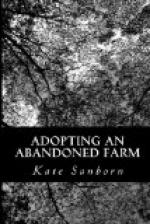* * * * *
“While willow-pattern china was passing into other hands the Spectator made a discovery. A curious piece of polished, crooked mahogany was seen lying between soup tureens and gravy boats. He picked it up cautiously, fearing to attract attention, and, with one eye everywhere else, scanned it closely. What a curious paper-knife! he thought, and slyly tucked it back of a pile of plates. This must be kept track of; it may prove a veritable prize. But all his care went for naught. A curious old lady at his elbow had seen every action. ‘What is it?’ she asked, and the wooden wonder was brought to light. ’It’s an old-fashioned wooden butter knife. I’ve seen ’em ’afore this. Don’t you know in old times it wasn’t everybody as had silver, and mahogany knives for butter was put on the table for big folks. We folks each used our own knife.’ All this was dribbled into the Spectator’s willing ears, and have the relic he would at any cost. Time and again he nervously turned it over to be sure that it was on the table, and so excited another’s curiosity. ‘What is it?’ a second and still older lady asked. ‘A colonial butter knife,’ the Spectator replied with an air of much antiquarian lore. ’A butter knife! No such thing. My grandfather had one just like this, and it’s a pruning knife. He wouldn’t use a steel knife because it poisoned the sap.’ What next? Paper knife, butter knife, and pruning knife! At all events every new name added a dollar to its value, and the Spectator wondered what the crowd would say, for now it was in the auctioneer’s hands. He looked at it with a puzzled expression and merely cried: ’What is bid for this?’ His ignorance was encouraging. It started at a dime and the Spectator secured it for a quarter. For a moment he little wondered at the fascination of public sales. The past was forgiven, for now luck had turned and he gloried in the possession of a prize.




